B.C. Indigenous Climate Adaptation Working Group members
The B.C. Indigenous Climate Adaptation Working Group (ICAWG) consists of members who identify as Indigenous or who have been selected to represent an Indigenous community/organization.
Working group co-chairs
Trent Moraes, Skidegate Band councillor-deputy chief councillor
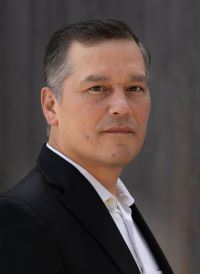
Nangkilslas, Trent Moraes, is a Haida from Skidegate, Haida Gwaii. He is an elected member of the Skidegate Band Council and is the deputy chief councillor. He spent a decade in administration as the director of Housing, Lands & Energy for the Skidegate Band Council. Trent helped create and maintain an energy portfolio in Skidegate and for Haida Gwaii.
He is also a member of several groups, including the First Nations Home Energy Save Advisory, Indigenous Clean Energy Opportunity Electricity Table Advisory Group, First Nations Remote Community Energy Strategy Working Group, and current chair of Aboriginal Capital Committee, Indigenous Climate Adaptation Working Group, and Indigenous Coastal Climate Coalition.
Trent helped the Skidegate Band Council study the needs of the community and islands, educated the public on the emerging technologies and energy efficiency strategies available, and invested in solar hot water and solar photovoltaics for community and residential buildings. Skidegate has engaged BC Hydro on many levels and created Indigenous pilot programs for B.C. The Skidegate community goal is to become one of the greenest communities in B.C.
Denni Clement, Coastal First Nations-Great Bear Initiative climate action peer network lead
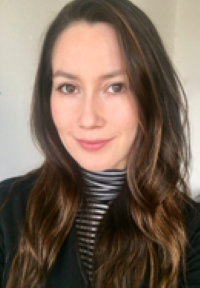
Denni Clement is from ʔAq'am, a Ktunaxa Nation community located in the Kootenay region of BC. She is a facilitator, planner, researcher, community engagement, climate resilience, and sustainability specialist. Denni led the creation of ʔAq'am’s comprehensive community plan from 2009 to 2011, and has contributed to ongoing planning efforts since.
Denni was accepted into the Indigenous Youth Internship Program in 2015. As an Indigenous youth intern for the B.C. Climate Action Secretariat, Denni engaged Indigenous communities across B.C. on climate change adaptation and resilience.
Working with the Fraser Basin Council, Denni is a lead author for the B.C. chapter of the national assessment on climate change titled “Canada in a Changing Climate” – as part of this work, Denni created and organized an Indigenous Youth Climate Art Contest. Denni has worked on several projects supporting the provincial government, and engaging Indigenous communities across B.C. on climate change risk and adaptation, including communications and workshop facilitation, generating What We Heard reports, and putting forth recommendations.
Denni is a member of the Pinna Sustainability team, and led Indigenous engagement for the University of Victoria’s Climate and Sustainability Action Plan. She currently serves as the Coastal First Nations-Great Bear Initiative climate action peer network lead, which involves supporting community coordinators to advance the climate action needs of their communities through overall capacity development. Denni holds a Bachelor of Arts with distinction from the University of Victoria and is a dancer performing regularly with Indigenous women’s groups in Victoria.
Working group members
Linda Morven, Nisga'a Nation
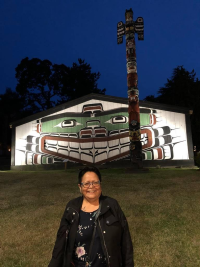
Linda Morven was the chief executive officer for the Nisga’a Village of Gitwinksihlkw from 2018 to 2023. Prior, she served as the chief health services officer and the corporate services manager for the Nisga’a Valley Health Authority, a Gitlaxt’aamiks Village Government council member, and vocational-technical coordinator for Wilp Wilxo’oskwhl Nisga’a Institute to name a few of the positions she’s held. Linda has also sat on several boards and committees including the Nisga’a Administrative Decisions Review Board, the Tripartite Emergency Management Working Group (First Nations Leadership Council, B.C. and Canada), and the Northern First Nations Alliance Health and Wellness Sub-Committee. Linda has a Bachelor of Arts degree with University of Northern British Columbia, a certificate in community economic development with Simon Fraser University, and completed various other training over the years. Linda is a layreader with Holy Trinity Church in Gitlaxt’aamiks, and plays the clarinet with the Harmonic Silver Band and Majagaleelhl Nisga’a Band. Linda is a community-builder, organizing community events, projects and plans, and strongly believes in working with the people in her heart and mind at all times.
Brenden Mercer, decision support manager, First Nations Emergency Services Society
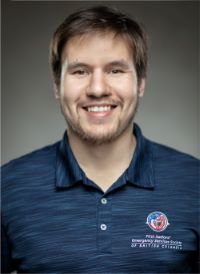
Brenden Mercer lives and works in the beautiful Tk’emlúps te Secwépemc Traditional Territory in Kamloops, B.C.
He works for First Nations Emergency Services Society (FNESS) as the manager of the decision support department. FNESS is a non-profit organization governed by a First Nations Board of Directors that works with communities on various emergency management initiatives to improve overall health and safety. Upon starting at FNESS in 2015, Brenden became a local FireSmart representative and a Registered Forest Technologist through the Association of BC Forest Professionals. Also, he completed a Master of Science in environmental practice through Royal Roads University (RRU). More recently, he is working on a Doctor of Business Administration program at RRU.
During his time at FNESS, Brenden assisted many First Nations communities with various aspects of emergency management, including the completion of many FireSmart prevention activities. More recently, he has been leading the integration of a decision support tool at FNESS to better support the First Nations communities they work with.
N̓aasʔałuk (John Rampanen), chief councillor, Ahousaht Nation
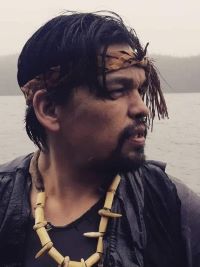
N̓aasʔałuk comes from ʕaḥuusʔatḥ (Ahousaht) and qiłcmaʔatḥ (Keltsmaht) ancestry within the nuučaan̓uł (Nuu-chah-nulth) territory on the west coast of Vancouver Island, B.C. John has been the elected chief councillor as of June 2022. He is a cultural consultant, historian and decolonial strategist that is actively involved with language and cultural revitalization, specializing in areas of spirituality, medicinal practice and plants, history, traditional governance, and Indigenous foods.
N̓aasʔałuk is also an independent instructor with the University of Victoria where he develops and offers land-based approaches to language immersion through a nuučaan̓uł lens. A former founding member of the West Coast Warrior Society, he is also an advocate and activist with a firm stance on Indigenous sovereignty. As a father of eight, he shares a family-oriented approach toward cultural revitalization and firmly believes that language and connecting with land is the key to the future well-being for Indigenous peoples.
Ianna Lewis, climate action strategy technician, Rights and Title of Squamish Nation

Ianna is from the Squamish Nation. She has lived on reserve most of her life and is very connected to her community. For the past 10 years, she has gone around the lower mainland of B.C. to teach school districts who the Squamish Nation people are.
For the past year, she has worked as a climate action strategy technician at Rights and Title for Squamish Nation and is passionate about climate action strategy plans.
She is excited to join the ICAWG to learn from everyone and gain experience. She is proud to be representing Squamish Nation as a young woman while discovering ways to help the environment.
Sabrina Dulude, environmental field technician and engagement coordinator, Chu Cho Environmental
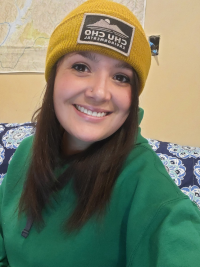
Sabrina is a Tsek’ene Dene from the Tsay Keh Dene nation located in north central B.C. She returned to her village nearly four years ago after living in Saskatchewan for 25 years and Mackenzie, B.C. for 10 years prior. She currently works as an environmental field technician and engagement coordinator for Chu Cho Environmental, a company owned by Tsay Keh Dene, and is also working towards her Environmental Monitoring Certificate through University of Northern British Columbia. Sabrina embodies a strong connection to the land and waters, spending her non-working hours out on the land either fishing, kayaking, hunting, hiking or camping.
Sabrina is passionate about working alongside others to create plans for communities to grow and survive, yet again, through so many trials. She is honoured to sit alongside so many hard working and determined people who only want to see their communities thrive and stay resilient in the face of a changing climate.
Kyla Horsting-Minnabarriet, scientific resource assistant, BC Timber Sales - Kamloops
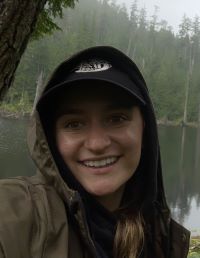
Kyla Horsting-Minnabarriet is Nlaka’pamux and Secwepemc through her father Darin Minnabarriet. She grew up in and around Ashcroft, B.C., but currently lives on Tkemlups te Secwepemc where she attends Thompson Rivers University.
Kyla is just about finished her Bachelor of Science in natural resources science and is excited to continue to learn about the land from knowledge holders in her family, community, and other nations. Kyla has witnessed the impacts that climate change has had on her nation with the extreme heat waves, fires, and floods. She is passionate about finding a way to responsibly manage and maintain the traditional, ancestral, and unceded territories as it is vital to both the physical and mental health of our communities.
Patrick Michell, former Chief, Kanaka Bar Indian Band
Patrick Michell is a member of the Nlaka’pamux Nation and has lived in B.C.’s Fraser Canyon all his life. Patrick has an administrative management diploma from Douglas College and a Bachelor of Law degree from University of British Columbia. After working in Vancouver with Department of Fisheries and Oceans Canada and Indigenous and Northern Affairs Canada, Patrick articled with the Ministry of Attorney General and Richards Buell Sutton before being called to the Bar in 1997. Patrick practiced law in the Fraser Canyon until 2005 after which he became a community liaison for the Kwoiek Hydro Project. The community liaison role transitioned into the community economic development officer after the Kwoiek Hydro Project was completed in January 2014.
With the retirement of Chief James Frank in the spring of 2015, Patrick became the Chief of Kanaka Bar in the community’s first election in over 30 years. Patrick lost his home and hometown on June 30, 2021 in the Lytton wildfire and retired as Chief to focus on rebuilding his family's lost intergenerational home, and to support, where possible, the Fraser Canyon region's recovery and rebuild from that fateful and devastating day.
Michael Vegh, hailcistut implementation manager, Heiltsuk Nation
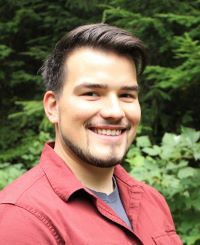
Michael Vegh is a youth from Heiltsuk Nation. He is the hailcistut implementation manager for Heiltsuk Tribal Council, overseeing $68 million across 53 unique projects related to marine and fisheries, economic development, language revitalization, housing, and self-governance. Hailcistut is the Heiltsuk term for reconciliation, which means "to turn things around and make them right again."
Michael is also the community energy planner for the Heiltsuk Climate Action Team, who recently finished the Heiltsuk Community Energy Plan. He has experience in rural community connectivity, international relations, Indigenous law and protected areas, marine conservation, and guardian watchmen stewardship. Michael was recognized as Corporate Knight's Top 30 Under 30 Sustainability Leaders of 2021 and Future of Good's 2021 Young Impact Leaders.
Karen Brady, land stewardship manager, Stó:lō Service Agency
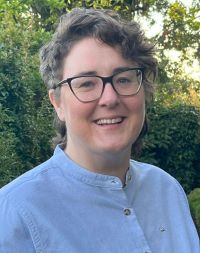
Karen was born and raised in Ireland. In 2009 she moved to S’ólh Téméxw, the traditional lands of the Stó:lō. Her work in land stewardship started over two decades ago at the National Institute for Research in Digital Science and Technology in France where she researched image processing techniques to improve the accuracy of mapping environmental areas of interest. Karen went on to work at the University of Queensland where she applied these techniques to the mapping of coral reefs in Australia and Micronesia for monitoring ecosystem health and detecting climate change related impacts such as coral bleaching events.
Working alongside local communities, scientists, stakeholder groups, and government agencies, Karen developed an awareness of the complexities inherent to meaningful collaborative environmental stewardship and the depth of work needed to move forward in just and sustainable ways. In 2011 she joined the Stó:lō Research and Resource Management Centre as a land use planner and eight years later moved into her current role as land stewardship manager. Karen and her team are responsible for managing the S’ólh Téméxw Guardians Program, an initiative of the S’ólh Téméxw Stewardship Alliance (STSA) that provides Stó:lō-led Indigenous stewardship of the land, water, and natural and cultural resources within S’ólh Téméxw. She and her team also oversee operations for the Collaborative Stewardship Forum (CSF), a multi-year collaboration between the STSA and the Government of British Columbia. Karen co-leads a number of the CSF projects with her colleagues from various B.C. ministries. Over the past six years, she has also supported several Stó:lō-led climate change related projects, including hazard assessments, a pilot study on the impacts of climate change on cultural heritage, and a watershed-scale assessment of climate change. Karen was a member of the original B.C. Indigenous Climate Adaptation Technical Working Group, and is honoured to be part of the ICAWG to continue this good work.
Janelle Lapointe, community and youth organizer, David Suzuki Foundation
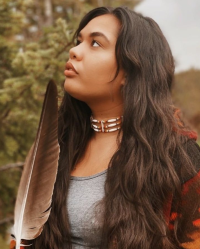
Janelle Lapointe is an Afro-Indigenous climate justice and Indigenous rights organizer from Stellat’en First Nation. Growing up in her matrilineal homelands imbedded a sense of responsibility to the land and water that guides her work and ways of knowing. She has also witnessed firsthand how extractive systems and industry practices not only degrades our natural environment, but is deeply connected to cultural genocide and the epidemic of missing and murdered Indigenous women and girls. She now advocates for a healthy environment, ensuring anti-racism and intersectionality are at the forefront of climate conversations.
She has been a guest on Sḵwx̱wú7mesh (Squamish), Səl̓ílwətaʔ/Selilwitulh (Tsleil-Waututh) and xʷməθkʷəy̓əm (Musqueam) territories since 2018, and currently works at the David Suzuki Foundation as a community and youth organizer. Her areas of expertise are movement building and mobilization, storytelling, and intersectional approaches to climate justice. She hopes to deepen her leadership and relationships and use her lived experience to inform the ICAWG.
Judy Wilson, former Chief, Neskonlith Indian Band
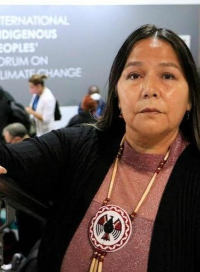
Judy Wilson served her community of Neskonlith for 16 years as Chief and eight years as a council member. She is a strong advocate for recognition of inherent title and rights and self-determination and for the fundamental shifts needed for the survival of all Peoples. These shifts involve transitioning to clean energy (not depending on fossil fuels or pipelines), changing consumer purchasing patterns away from big conglomerates toward local foods and lifestyles, supporting and maintaining traditional food security and harvesting, lessening our footprint on the land, and restoring lands, lakes, rivers and oceans.
Her education includes year one/two public administration with focus on governance, public relations, and media (audio-visual production, book publishing, broadcast journalism, and web planning). Her experience includes: 25 years in public relations, data technician, communications officer, project developer, news reporter, broadcast manager, and marketing coordinator.
Judy served as a member of the following boards and committees: the Union of BC Indian Chiefs Executive as secretary-treasurer, the First Nations Leadership Council, the Assembly of First Nations (AFN) Comprehensive Claims Policy Committee, the BC Specific Claims Working Group, the BC Small Business Roundtable, the Secwepemc Chiefs Health Caucus, the Rural BC Board, and several other community-based committees. She has formerly served on the BC-Canada Tripartite Children and Family Working Group, the BC All-Chiefs Task Force, the First Nations Child and Family Wellness Council, the First Nations Technology Council, and the Secwepemc Cultural Education Society.
Candice Wilson, environmental manager, Haisla Nation
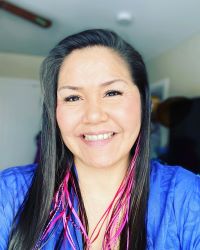
Candice Wilson is a proud member of the eagle clan originating from the Haisla Nation with roots also from the Nisga'a Nation. A culturally driven, experienced biologist with a demonstrated history of working for Indigenous government administration, Candice is skilled in environmental, compliance, environmental issues, sustainability, water quality, and mitigation.
Candice's education includes a Master of Science in environmental protection, a Graduate Certificate in science and policy of climate change and a Graduate Certificate in Indigenous economic development from Royal Roads University, as well as a Bachelor of Science in environmental science and a Certificate in traditional ecological knowledge from University of Northern British Columbia.
Stephanie Papik, director, BC Public Service, Moose Hide Campaign Society
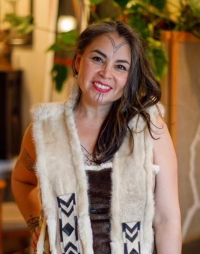
Stephanie Papik is a daughter, sister, mother of two young adults, aunty, public servant, social entrepreneur, and artist. Stephanie is of Yupik, Inupiaq Inuvialuit, Irish, Scottish and Spanish ancestry. She/they were born in Akaitcho Territory, Northwest Territories (NWT), and grew up in Lekwungen Territory. At the age of 24, Stephanie moved back to Yellowknife, NWT to learn more about her culture and strengthen family relations. She returned to Vancouver Island and for 16 years has worked in the provincial government, including six years as lead for the Indigenous Youth Internship Program, which won the Public Sector BC Workplace Inclusion Award for Diverse and Inclusive Culture Champion.
In 2017, Stephanie was appointed to the Office of the Premier of BC to assist with the New Democratic Party coming into power. She then moved on to and has been with Emergency Management BC since 2018 as the director for strategic integration of Indigenous knowledge, cultural safety and humility. Stephanie recently began a temporary assignment with the Moose Hide Campaign on March 31, 2023 as the director for the BC Public Service. Stephanie has been a practitioner and a board member for the Circle Way since 2018, sharing circle as a key tool for reconciliation in practice.
